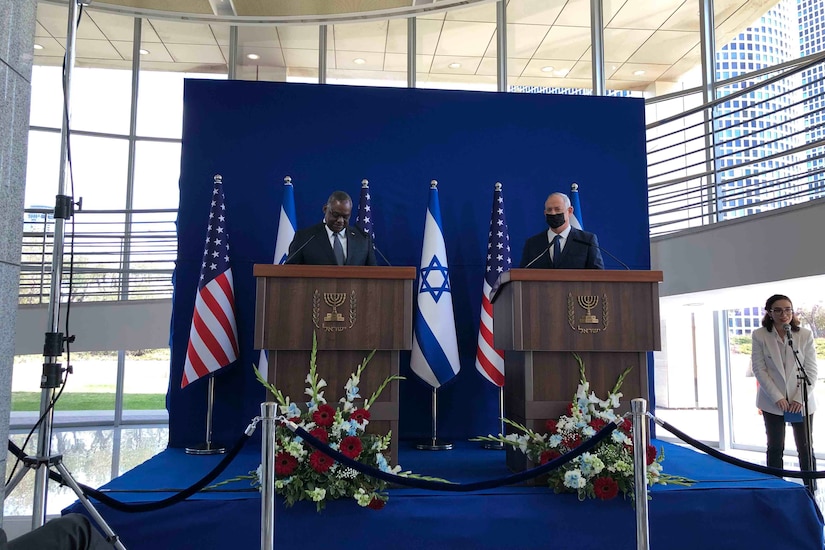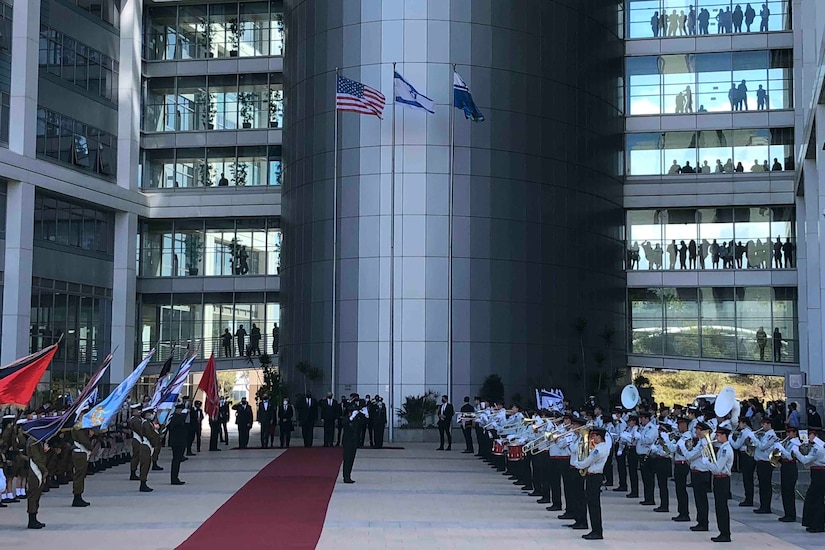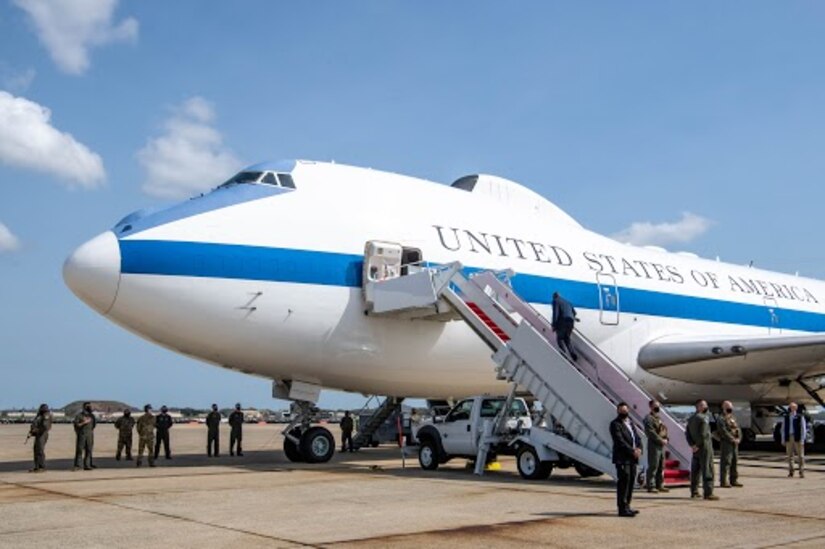April 11, 2021
STAFF: Good afternoon, everybody. My name is Betty Ilovici. And it is my great honor to welcome United States Secretary of Defense Lloyd Austin to the State of Israel and to the Ministry of Defense in particular.
We wish you a meaningful and fruitful visit. To our members of the press I will note that the minister has recently finished a series of bilateral briefings and will now be delivering the remarks.
Starting with Israel's Minister of Defense Benny Gantz. Minister Gantz, the floor is yours.
ISRAELI MINISTER OF DEFENSE BENNY GANTZ: Thank you. Secretary Austin, it is an honor to welcome you here. We thank you for making Israel your first visit to our region, reflecting the enduring relationship between the United States and the State of Israel.
Jonathan Shrier, thank you for enabling it. Mr. Secretary, you and I go back, so I can say first hand that we are very fortunate to be welcoming an outstanding professional and true patriot here.
Our Ministry of Defense and your Department of Defense share the same vision for global security, stability and prosperity. Our partnership is built not only on strategic interest, but on shared values, history and personal relationship. Like your late father, who served his nation as a soldier in this same Allied forces that freed my late mother from the hold of the vile Nazis, today we remain committed to fighting for freedom, democracy, and for the protection of innocent people. Now we both, Israel's defense forces and American armed forces, the same values in basic human decency compel our moral standard in actions.
To our enemies, trying to use our own morality against us and to the cynical attempt to abuse the ICC, I say that they will not succeed in preventing us from fulfilling our duty. We will never neglect our moral obligation to defend human lives and to remain humane as we do so.
Please convey my appreciation and gratitude to President Biden and the entire administration for supporting Israel and opposing the recent decision taken by the ICC.
In our meeting earlier, Secretary Austin and I agreed to continue in the close consultation on the urgent regional security challenges. I also expressed our commitment to continuing working closely with the United States with true bipartisan support on Israel's long terms planning for defense acquisition to maintain Israel's QME, essential not only for the guarantee for Israel's security, but as a guarantor of the Middle East stability.
During our conversation, I emphasized to Secretary Austin that Israel views the United States as the full partner across all operational threats, not the least, Iran.
The Tehran of today possess a strategic threat to international security to the entire Middle East and to the state of Israel. And will work closely with our American allies to ensure that any new agreement with Iran will secure the vital interest of the world, of the United States, prevent dangers, unrest in our region and protect the state of Israel.
I further told the Secretary that we are continuing to work closely with the Palestinians authority to help bring stability and prosperity to our close neighbors, Israel.
Lastly, let me say that after a year, of which shook the world to its core, I find great comfort in the assurance of our people's unbreakable bonds and in the knowledge that both in the United States and in Israel, forces of good act to promote unity, solidarity and diversity. Values that I protect in my country and that you, throughout your outstanding career of inspiring public service, exemplify in yours.
I am certain that under President Biden's leadership, our bonds will continue to grow and achieve new heights. Thank you very much and welcome to Israel.
STAFF: Please, Secretary Austin.
SECRETARY OF DEFENSE LLOYD J. AUSTIN III: Well, good afternoon everyone and thank you for being here. First and foremost, I'd like to thank Minister Gantz for the warm welcome. And my deepest thanks to the people of Israel for their gracious hospitality.
You know we all took the time last week to remember the Holocaust. And Minister Gantz, you as a son of Holocaust survivors know better than most the horror and heartache your family endured.
We remember the 6 million Jews and the millions of others who perished during the Holocaust. May their memory be a blessing and let it be solemn reminder of our duty to be ever vigilant against mass atrocities.
It is indeed a privilege to be here in Tel Aviv on my very first visit to Israel as a Secretary of Defense. And I'm grateful for the opportunity to meet with the Minister, despite the challenges from COVID-19.
It is especially meaningful to join him here ahead of Remembrance Day, which is a most solemn day, honoring those who have fallen in the service to their country is a tradition shared by both Israel and the United States as we recognize the sacrifices our brave service members in uniform make to protect our people and preserve our way of life.
Today, I was tremendously pleased with our discussion on a number of security issues, which are important to our two countries. And I wanted to convey the Biden-Harris administration's strong commitment to Israel and the Israeli people.
As a major strategic partner for the United States, our bilateral relationship with Israel in particular is central to regional stability and security in the Middle East. And during our meeting, I reaffirmed to Minister Gantz, our commitment to Israel is enduring and it is iron clad.
And I pledge to continue close consultations in order to insure Israel's Qualitative Military Edge and to strengthen Israel’s security. We both agree that we must work closely together to enhance U.S./Israel Defense cooperation and to advance shared security interest and priorities.
And I appreciate -- appreciated hearing Minister Gantz's perspectives about the challenges in this region. We addressed a broad range of defense issues, to include Israel's long term planning for defense acquisitions; and regional security challenges; and U.S. support for efforts to normalize relations between Israel and Arab and Muslim majority nations.
Today's discussions were quite productive and I want to once again thank Minister Gantz for his gracious hospitality. And I look forward to reciprocating this hospitality when you're able to visit the Pentagon and I hope that's one day soon.
MIN. GANTZ: Hopefully.
SECRETARY AUSTIN: Mr. Minister, our dialogue today gives me great confidence in our already strong and enduring security partnership. This is a relationship built on trust, which has developed over decades of cooperation and I look forward to building upon that trust in the years ahead.
Thank you very much.
MIN. GANTZ: Thank you.
STAFF: Thank you, everyone.
MIN. GANTZ: (Inaudible).
STAFF: No, no questions.
MIN. GANTZ: Thank you.










